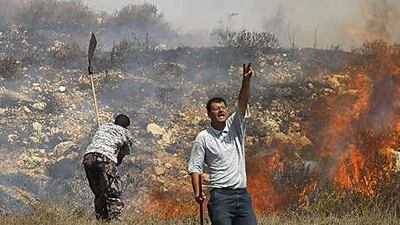TEL AVIV // A shortage of Arabic translators for Palestinians alleging they suffered violations by Israeli soldiers is significantly undermining the military's investigations of their claims, an Israeli human rights group has said. Yesh Din, which documents violations against Palestinians in the Israeli-occupied West Bank, said this week that Palestinians arriving for meetings with military investigators to give their testimonies are increasingly not being provided help in translating their statements from Arabic into Hebrew or do not receive co-operation from the translator who is present.
The group said that often the complainants lose a day of work to travel for hours to meet the investigators, only to be told upon arrival that no interpreter is available. Activists said the shortage of translators is sharply reducing the chances of success for Palestinians seeking justice for alleged crimes by soldiers, including killings, assault or theft and looting during searches, as well as soldiers failing to act while settlers nearby commit violations against Palestinians.
Additionally, they said, the inadequate translation may be a further sign that Palestinian complaints are viewed as a low priority. But the translation shortage also reflects a broader trend of increasingly fewer Jewish Israelis being drawn to studying Arabic, Israel's second official language. Education officials say the Israeli conflict with the Palestinians, increasing tensions between the country's Jewish majority and its Arab minority and a campaign by the current right-wing government to emphasise Zionist studies is turning students away from Arabic.
Indeed, Ghanayim Mahmud, the head of Arabic and Islamic studies at Tel Aviv University, said in an interview that the share of Jewish students in his programme has decreased. Currently, Jews account for 60 per cent of a total of about 250 students, down from 80 percent a decade ago, he said. Emily Schaeffer, a lawyer working with Yesh Din, said the Israeli military police have never instituted a formal system of providing Arabic interpreters for Palestinians.
She added: "Palestinians often want to give their testimonies in their own language and that is their right." According to Ms Schaeffer, the military police does not even have a physical presence in the West Bank, making it difficult to file a complaint in the first place. But once an investigation is started, the lack of translators holds it up for weeks or months. Ms Schaeffer said the military police station in the southern Israeli city of Beer Sheva, which is also responsible for processing complaints from Palestinians in the southern half of the West Bank, has put all testimonies of Palestinians on hold in the past four weeks because it has no translator.
She added the prolonging of an investigation damages its effectiveness. "The longer it takes to take testimony, the more memories fade and the harder it becomes to find suspects. Also, physical evidence may have disappeared," Ms Schaeffer said. She said soldiers who may have been witnesses may have been discharged by the time a probe is launched, making it harder to find witnesses. Mohand Anati, a field researcher for Yesh Din, said three Palestinians from a village near the West Bank town of Hebron complained a year ago to the military police about an allegedly unjustified shooting by soldiers and an attempt by Jewish settlers to attack them.
Just last month, the military police launched an investigation, but three times cancelled appointments for taking testimonies just hours before they were scheduled because it did not have translators. On the third time, the complainants had already arrived at the military police station and waited for nearly five hours while the policemen on duty searched the station in vain for an Arabic-speaking soldier before they were told to return another time.
Mr Anati said: "Some of the Palestinians think this is intentional because the army does not want to investigate their complaints, and some of them feel like their complaints are being ridiculed. There are also those who give up and say they will stop seeking an investigation or not file complaints in the future." foreign.desk@thenational.ae

